The Topp Twins: musicians, comedians, and courageous campaigners for the rights of women, gay and lesbian people, unions, and a nuclear-free New Zealand mark 60 years on 14th May 2018.
Jools and Lynda join Chris Bourke to tell some Topp tales.
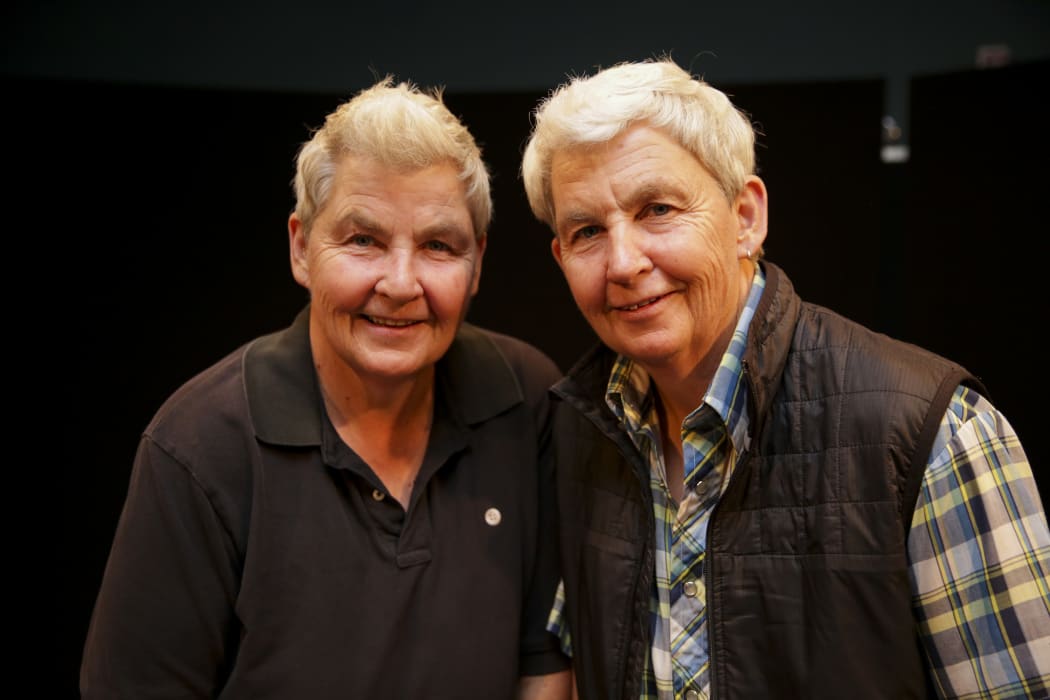
Photo: RNZ / Richard Tindiller
Story in collaboration with Audioculture
It can’t be long before the Topp Twins are featured on a bank note, so enshrined are they in New Zealand culture. In March 2018 two prime ministers turned out to honour Jools and Lynda Topp when a touring exhibition about them opened at the National Library, over the road from Parliament.
Dominating the large gathering were stalwarts of the many movements the pair have championed for 40 years: courageous campaigners for the rights of women, gay and lesbian people, unions, and a nuclear-free New Zealand. The 2009 documentary Untouchable Girls was described as “the history of New Zealand in the time of the Topps” – and historians, archivists and activists were on hand to make sure it was recorded properly.
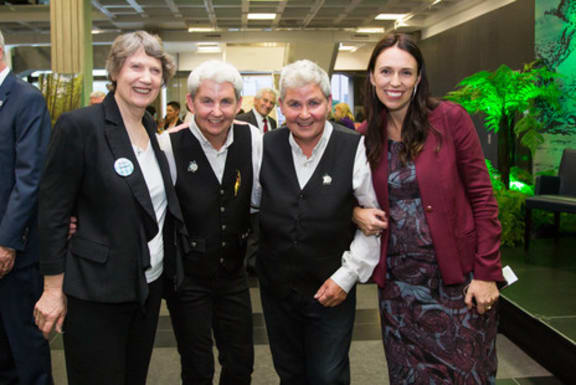
Helen Clark, Jools and Lynda Topp, and Jacinda Ardern at the launch of the Topp Twins' exhibition at the National Library, Wellington, 26 March 2018 Photo: Mark Beatty/National Library of NZ © 2018 National Library-Imaging Services, Department of Internal Affairs
Earlier that day Jools and Lynda explained to AudioCulture’s Chris Bourke that the political and the personal are inseparable in what they do, and so too is music.
In the past couple of decades the widespread success of the Topps’ many television series have eclipsed the fact that, first and foremost, the sisters always were, and remain, a music act.
Their television alter egos Ken and Ken, Camp Leader and Camp Mother – and many others straight from an A&P show – have overshadowed their actual personae.
“Sometimes,” says Jools, “people forget about our music, because they see the characters on television …” Lynda: “We make them laugh.” Jools: “… the most important thing is that the songs and the music have always been the vehicle. That’s the vehicle that got us from A to B, and a stage show. It’s the music that got us through the documentary.” Lynda: “All the characters have their own songs now. The music is number one.”
The early days of the Topps is well known. How, while growing up on the farm of their parents Jean and Peter – at Ruawaro, near Huntly in Waikato – their older brother Bruce gave them a guitar and the book Play in a Day. Jools was immediately drawn to the instrument, says Lynda. “She read that book from cover to cover for that first day. And then she kind of threw it away. And that was it.”
Jools: “It did exactly what it said it was going to do on the front cover. Play in a Day. So I did. I learnt all the chords, in a day, and from that moment on I’ve never done any other thing with a guitar ever. I do play the guitar simply but I had a wonderful upbringing in the sense that I spent a lot of time down the back of the bus going home from Huntly College with the Māori kids in the back, where they would teach me the Māori strum.
“To play the Māori strum is pretty out there. You’re playing the drums, the harmonica and a guitar all at the same time. Because you’re dampening the string, you’re using your hands, [Lynda: “You’re playing the rhythm as well.”] So I learnt it, and the thing is, when the Topp Twins sing there is no drums, there is no bass, we’ve just got one guitar and two vocals. So I’ve been playing percussion and guitar and finding different ways of how I would play that guitar. I found my own sort of reggae style, that isn’t reggae. Sometimes when we are alone we have to make things happen. That isolation is where originality comes from. You’re not being influenced by other people playing around you.”
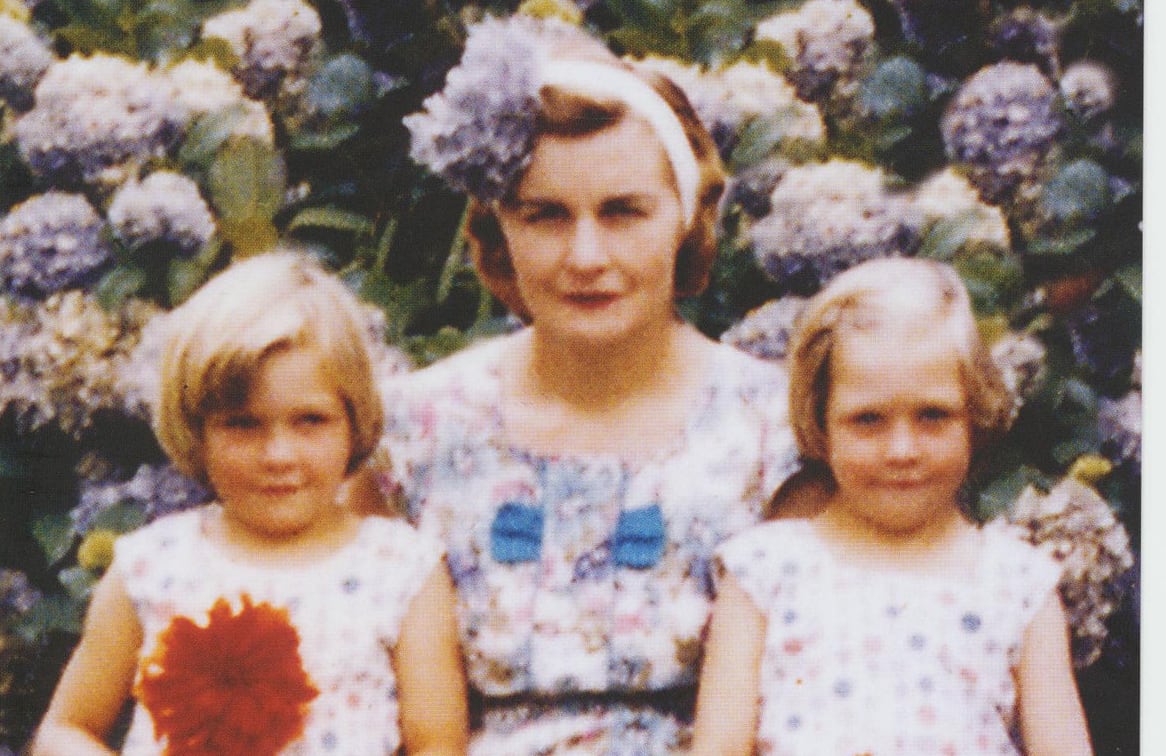
Topp Twins, cover of Flowergirls & Cowgirls Photo: supplied
The country influence is explained by an oft-told story of the sisters riding their horses to a neighbouring farm, where there was a 78rpm wind-up gramophone with discs by Australian yodellers and cowgirls Shirley Thoms and June Holmes. But the Topps’ mother would forbid them from taking their guitar on horseback expeditions. “So we’d ride like maniacs, wind the gramophone up, listen to the song and try and keep it in our head,” says Lynda. “Then we’d ride like the wind back home and get the guitar out. By the time we got home we’d sort of lost the tune. We became very good riders and horse women, but it did take quite a while to learn those songs and get the idea of singing and yodelling.”
One of the Australian 78s inspired Lynda to take up yodelling: ‘My Pinto Pony And I’ by June Holmes.
“I went into a ‘yodel coma’ I call it, and I just thought I gotta learn how to do that. I was absolutely mesmerised by the sound.” So she started listening to the gramophone intently – “There was no musical teacher that could teach me yodelling” – and went down to the back of the farm to practise.
“For a long time it sounded like a strangled cat,” says Jools. “There was a lot of practising, probably about five or six years before she actually sang publically with a yodel. I had no great desire to yodel whatsoever. I just tagged along on the coat tails of Lynda’s fame about yodelling,” she says, laughing. “It’s worn off on me. At a certain point now I can yodel but only if Lynda’s yodelling.”
In 1976, after leaving school, the Topps joined the Territorials, posted at the Burnham Military Camp near Christchurch for six weeks. Then fate took a different turn. Lynda: “We were supposed to go back to the Waikato, take over the dairy farm, and become Territorial soldiers: that would have been our life. But for some reason, we rang Mum and Dad and said, ‘We did our basic training, we’re coming home to look after the farm,’ and Mum and Dad said, ‘You’re not coming home to look after the farm.’
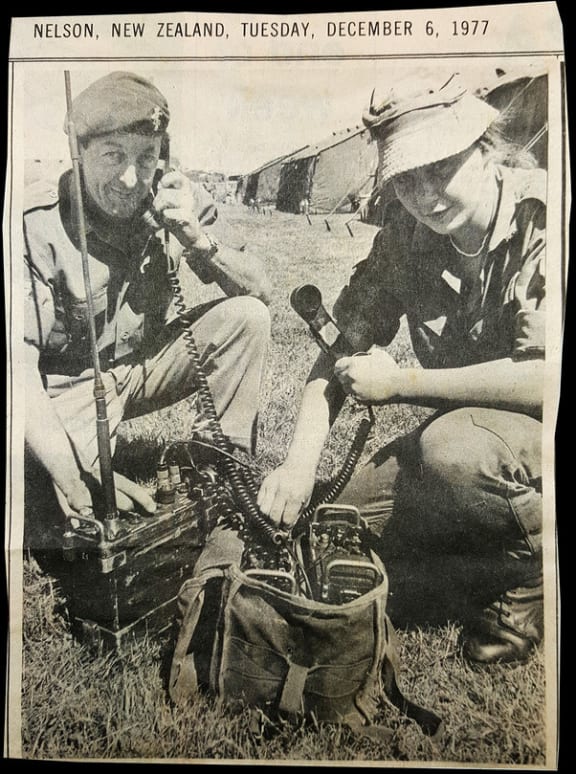
Lynda Topp in the Territorial Force Signals Platoon, Nelson, 1977 Photo: Photo credit: MS-Papers-11685-09, Alexander Turnbull Library
“We said, ‘What do you mean? That’s always been our vision.’ And Dad just said, ‘Look, if you come home and look after the farm you’ll be tied to it for the rest of your lives. Go and see the world.’ Which was amazing. Most country folks would say, ‘You gotta get back here, we’ve got to milk the cows tomorrow.’ But they said, go and see the world.”
The Topps’ world at that stage was Christchurch – “We’d gone overseas” – and so they decided to “jump train” and stay there. They soon met a dynamic woman singer who held them spellbound: Nancy Kiel.
Lynda: “She played in many bands, but the Little Baby Boogie band was the one she was playing in when we met her. She was amazing, she was technically brilliant, with the best voice, and the most amazing stage performance.” Under age, the Topps snuck into the Gresham Hotel each Thursday to witness Kiel in action, while the elderly couple who ran the pub turned a blind eye: “They knew that we were absolutely smitten. Absolutely completely and utterly drawn to that performance of Nancy Kiel. We weren’t drinking, we’d just go up there and dance. We just loved it, it was magic.”
Kiel was the “Janis Joplin of Christchurch”, says Lynda. To Jools, “She was a rock star. She wasn’t part of the lesbian movement, she was part of the women’s movement. A lot of straight women were drawn to the lesbian world, because they saw themselves as being pretty out there: not identifying as lesbian but identifying as really strong, and they saw that strength in lesbian women.”
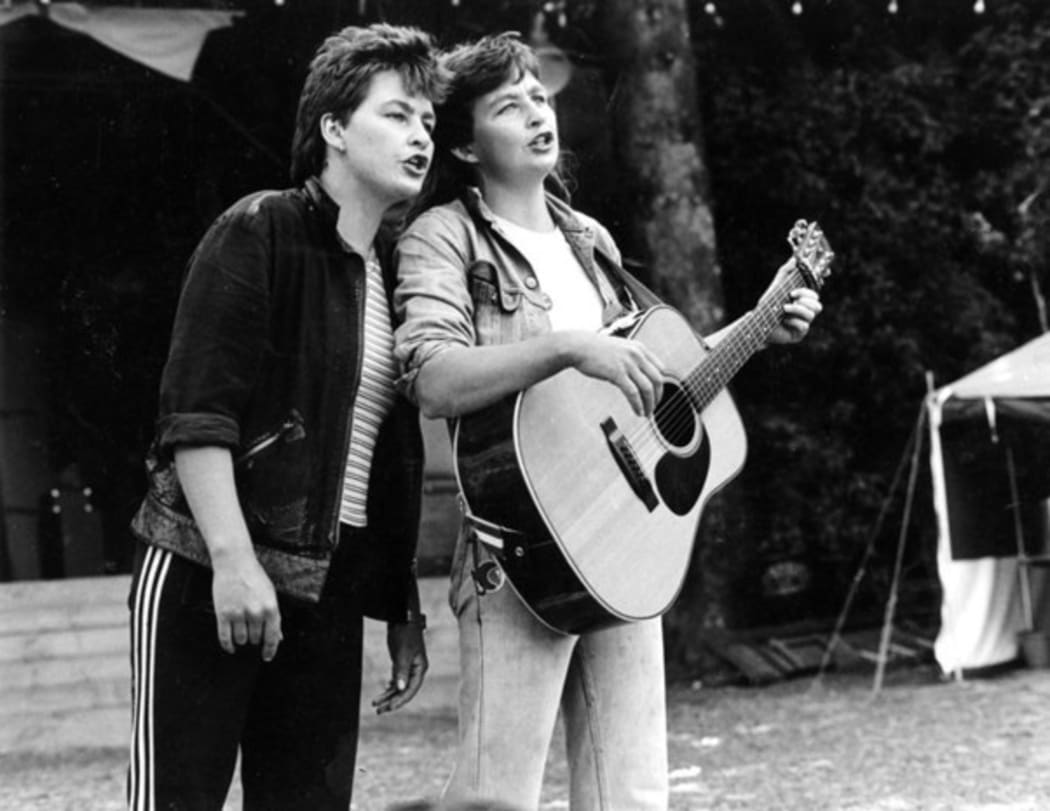
The Topp Twins in the early 1980s. Photo: 2015 Simon Grigg
It was at this stage that Lynda and Jools came out. “Coming out as lesbians for us was never ever a big deal. It was just something that happened. Nancy had invited us to a party after a pub gig, and we were so excited that we were going out with a rock star, to a party. And everyone else got in their cars and drove off, and Jools and I were still walking at that stage, so we arrived a little bit late. There was a group of women, these short-haired women, wearing guardsmen’s jackets and stuff, in the corner. And I said to Jools, ‘Look at them, over there – we’re just like them.’ And Jools said, yeah, we’re just like them. And then somebody said to us, ‘Oh come over and meet the lesbians …’
“And we were like, lesbians? Lesbians? We must be lesbians! They’re just like us! And you know what, from that day on afterwards, we identified as lesbians. There was no kind of angst or, ‘Oh my god what’s our parents going to do?’, or do we have to fall in love first.”
When the Topps began writing their own songs, the personal and the political were inextricably linked, and this emerged in early favourites in their repertoire such as ‘Untouchable Girls’, ‘Friday Night Get Up’ and ‘Good Sisters Gone Bad’. “You know what?” says Jools. “There isn’t really much of a gap of that in our lives.”
Lynda: “At that time we were …” Jools: “... hugely political in our personal lives. We didn’t put on our one costume that said, ‘Here’s my political character, and here’s my personal character’. We were living a personal/political life.”
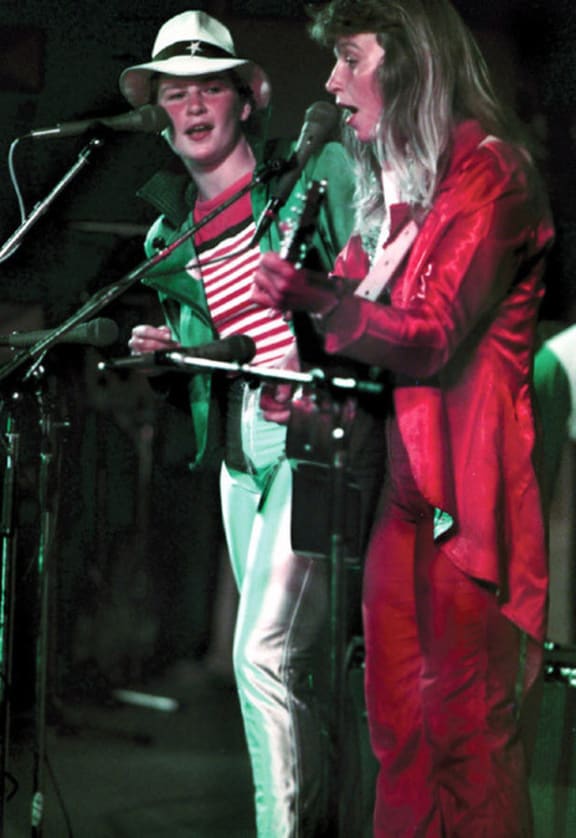
The Topp Twins on the Redhat stage at Nambassa, 1981 Photo: Audioculture
Apart from their exuberance and chutzpah, the most identifiable thing about the Topps in performance is their harmonies. Like countless sibling acts before them, from the Carters to the Louvins and the Finns, their approach to harmony stands apart. (Sibling harmonies seem to have something in common: in trying to hear themselves, or dominate the other, one voice is often pitched a little sharp.)
Every family that sings has its own harmony, explains Jools: “Every now and then what happens is we’ll be singing along and we’ll do this cross over, and a weird harmonic happens. We have to suddenly stop and go, ‘Wow that was weird, that freaked us out’.”
Lynda: “It’ll change, I’ll start off singing the melody line and Jools is doing the harmony and somewhere in the line of a song we’ll cross over and change. She’ll finish on the melody and I’ll finish off on the harmony.
Jools: “It’s a discord, when we change from that, right, and we’ve learnt how to handle that little bit of discord that happens along the way.”
Lynda: “It’s only a brief moment when the change happens, but now we just do it unthinkingly. We don’t sit down [and work it out]. We’re not technically brilliant but we like to be emotionally fantastic.”
Jools: “It just cannot be recreated; you can’t just say ‘I’m going to sing in the style of the Topp Twins’. Good luck buddy! Because you know we have our own timing and everything. Our very first recording, we were like, I’d play three beats here and then four beats the next time, and [the producer and musicians] didn’t know where the hell we were, and those guys said, ‘Well we don’t want to change how you sound’ – so they learnt how I played and then they had to undo 25 years of proper practical technical training and go, ‘This is weird, but it sounds quite interesting.’ ”
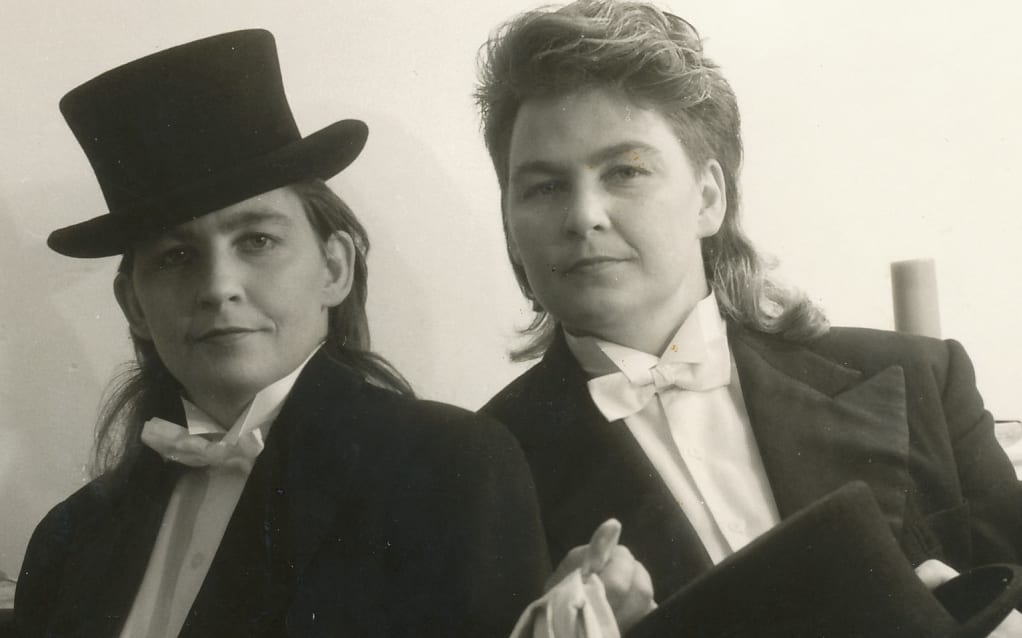
Jools and Lynda Topp Photo: Supplied
The Topps’ first paid gig was in Christchurch, in a small coffee shop full of students wearing duffle coats and playing chess; the pay was $5 each and as many toasted sandwiches as they could eat. They played for four hours. Soon they got an offer from a larger café in Dunedin, the Governor’s Café, run by “two funky men who knew the student scene was going to be big,” says Jools.
Shifting up to Auckland in the late 1970s took the Topps to another level, although they began by singing in the street for their supper. Vulcan Lane, off Queen Street, quickly became their domain: they drew massive lunchtime crowds and soon got mainstream media attention. A regular in the audience was on the staff of the Students’ Arts Council, then a very active events arm of the New Zealand University Students Association, running national tours, especially during Orientation.
“They just rocked up to us and said we want you to do a tour round New Zealand,” says Jools. “And from that moment on we were big names. It suddenly went stupid. And [as with] students, we all thought we were invincible, we could change the world, no one could stop us from doing anything, we were all highly politically motivated. And it was amazing because every political moment in the world needs a song, so there we were, ripe for the picking.”
Lynda: “One thing that our mum taught us was she said, ‘You must never hate anybody, you can dislike someone but you must never hate anybody’ and ‘You must always let everybody have a go, or give everybody the same chance as everybody else’. So we had that instilled in us by our mother, and then when we got out into the big wide world, we saw and felt that there were injustices: women weren’t paid as much as men, and all that kind of stuff. So I think we saw all these things in the world that we thought, okay we’ve got to do something, we’ve got to write a song about that.”
Jools: “Nothing’s changed though.”
“No, says Lynda. “I think things have changed – we’ve been a part of all of those movements: the Springboks tour, the nuclear-free New Zealand, Māori land rights issues, the homosexual law reform bill. All of those things, and we wrote a song for every one of them, and the great thing about it is that – when you look back – we won all of those things that we were part of. We won every fight that we ever fought.”
Jools: “Some of those songs became the anthems for that movement.”
But how you put across those anthems is the key. “Anybody can sing a song these days,” says Jools, “there are thousands of people who can get up at a karaoke bar, they might even be better singers than us. But can they create a show that holds an audience for two hours? That’s the trick. You can’t just have music or the songs, you have to have a way of relating to the audience. So we never see ourselves as just musicians or singers, we certainly don’t just see ourselves as comedians, you see, we’re vaudeville! We’re old school!”
Jools: “The music is utterly important. In fact the most important thing when it comes to the Topp Twins. We’d never do a show without a guitar in our hands.”
For all that, though, there is great satisfaction knowing you have been involved in challenging many political and social taboos, and been vindicated by history. “We like to think that we helped the gay and lesbian community come out, that we make it easier for them,” says Lynda.
“Just this morning we were in the airport,” elaborates Jools, “and a young man came up out of the blue and he said, ‘I just want to thank you for all the stuff you’ve ever done for all the gay community’. He was as camp as a row of tents ...”
Lynda: “He was probably in his early 20s, and we’re about to turn 60 …” (both laugh) “… so, you know, it’s nice that we’ve known that that has happened.”
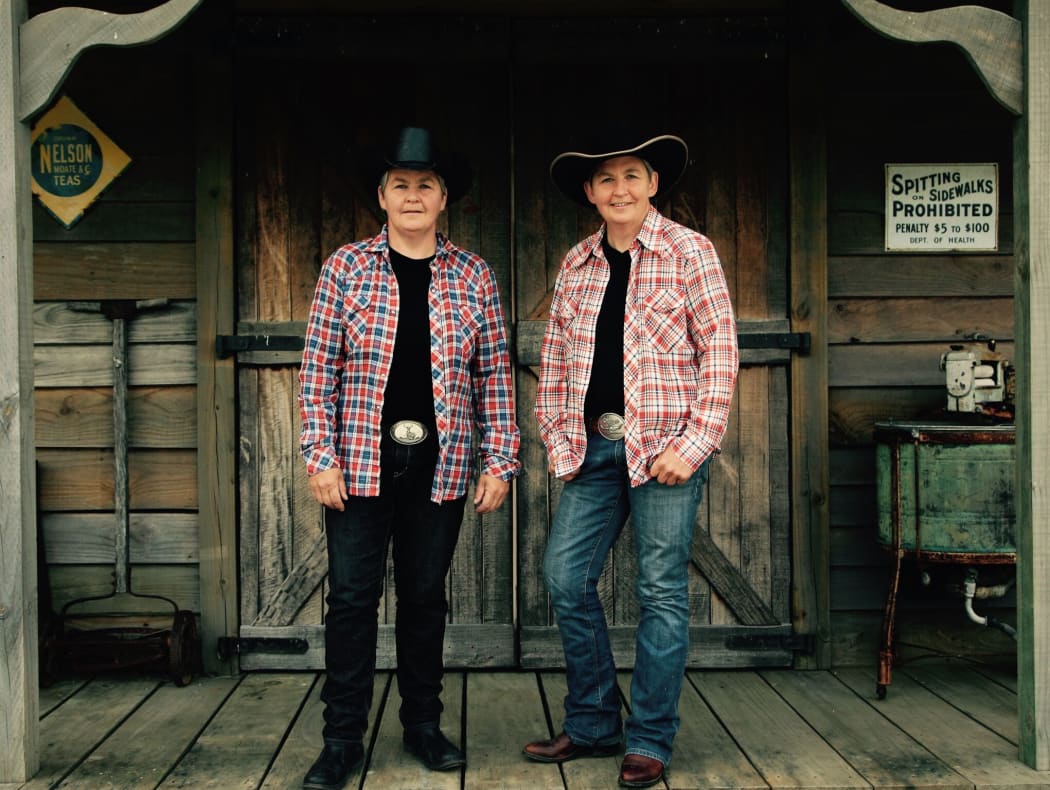
The Topp Twins Photo: supplied
Music Details
Artist: The Topp Twins
Songs: Untouchable Girls, History, Lover
Comp: J Topp
Album: The Topp Twins, The Very Best Of
Label: Diva
Artist: The Topp Twins
Song: Tomboy, No War In My Heart, Paradise
Comp: J Topp, L Topp
Album: The Topp Twins, The Very Best Of
Label: Diva
Artist: The Topp Twins
Song: My Pinto Pony and I
Comp: Burnette
Album: The Topp Twins, The Very Best Of
Label: Diva
Artist: The Topp Twins
Song: Bastion Point, Good Sisters Gone Bad
Comp: Topp
Album: Go Vinyl
Label: Dragon’s Egg
Artist: The Topp Twins
Song: Love Is Free
Comp: Topp
Album: No War In My Heart
Label: Festival
Artist: June Holm
Song: My Pinto Pony and I
Comp: Burnette
Album: Saddle Tramp Country Favorites
Label: Orange Leisure
Artist: The Topp Twins
Song: Nga Iwi E
Comp: H Melbourne
Album: The Topp Twins, The Very Best Of
Label: Diva
Artist: Nancy Kiel
Song: Take A Walk on the Wildside
Comp: Reed
Album: It’s Just A Race
Label: Private

